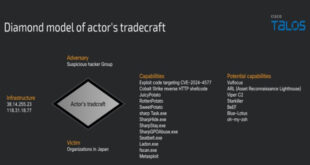A critical vulnerability, CVE-2025-24813, has been found in Apache Tomcat, which could let attackers execute remote code, leak sensitive data, or corrupt information. The Apache Software Foundation has released an urgent advisory, urging affected users to update right away. Apache Tomcat, a popular open-source web server and servlet container, has …
Read More »CVE-2025-24813
CISA Adds 3 Ivanti Endpoint Manager Bugs to KEV
CISA included three vulnerabilities in Ivanti Endpoint Manager—CVE-2024-13159, CVE-2024-13160, and CVE-2024-13161—in its Known Exploited Vulnerabilities catalog. Federal agencies must address these vulnerabilities by March 31, 2025, according to CISA’s directive, although no direct ransomware connection has been established. CISA updated its KEV catalog on March 10, 2025, adding three new …
Read More »Exploiting CVE-2024-4577, Attackers Target Japan with Cobalt Strike
Cisco Talos found that an unknown attacker has been targeting organizations in Japan since January 2025. The attacker exploited the CVE-2024-4577 vulnerability in PHP on Windows to access victims’ machines. They used the “TaoWu” plugins from the Cobalt Strike kit for further actions. A pre-configured installer script was discovered on …
Read More »
CVE-2025-22224
41,500+ VMware ESXi Instances Vulnerable to Attacks
As of March 4, 2025, Shadowserver found that over 41,500 internet-exposed VMware ESXi hypervisors are vulnerable to the actively exploited CVE-2025-22224. 41,500 unpatched ESXi instances represent a major part of global virtualization, especially in healthcare, finance, and telecommunications. Broadcom released an emergency update to fix a vulnerability that allows attackers …
Read More »
Update Now
Chrome 134 Released, Fixes 14 Vulnerabilities
Google has released Chrome 134 for the stable channel on Windows, macOS, and Linux, effectively addressing 14 security vulnerabilities. Among these are several high-severity flaws that could potentially allow remote code execution or lead to crashes. The update version 134.0.6998.35 for Linux, 134.0.6998.35/36 for Windows, and 134.0.6998.44/45 for macOS includes …
Read More »Broadcom Patches 3 VMware Zero-Days Exploited In Attacks
Broadcom issued a security alert on Tuesday, warning VMware customers about 3 exploited zero-day vulnerabilities. Vulnerabilities CVE-2025-22224, CVE-2025-22225, and CVE-2025-22226 affect VMware ESXi, Workstation, and Fusion. Patches have been released for all affected products, but no workarounds are available. CVE-2025-22224 is a critical VMCI heap overflow vulnerability in VMware ESXi …
Read More »
Update Alert!
Google Warns of Critical Android Vulns Under Attack
Google’s March 2025 Android Security Bulletin has unveiled two critical vulnerabilities—CVE-2024-43093 and CVE-2024-50302—currently under limited, targeted exploitation. These flaws affect Android versions 12 to 15, posing increasing risks for billions of devices. The bulletin requires the immediate installation of the 2025-03-05 security patch to address remote code execution and privilege …
Read More »CISA adds Cisco and Windows vulns as actively exploited
CISA has advised US federal agencies to secure their systems against attacks targeting vulnerabilities in Cisco and Windows. Although these flaws are being actively exploited, CISA has not shared specific details about the attacks or the perpetrators. CVE-2023-20118 allows attackers to execute arbitrary commands on RV016, RV042, RV042G, RV082, RV320, …
Read More »10 New Vulnerabilities Discovered in MediaTek Chipsets
MediaTek has released its March 2025 Product Security Bulletin, which highlights new security vulnerabilities affecting various chipsets in smartphones, tablets, AIoT devices, smart displays, OTT hardware, computer vision platforms, audio systems, and smart TVs. The bulletin reports 10 vulnerabilities, three of which are high severity. The high-severity ones could enable …
Read More »
CVE-2025-20111
Cisco Warns Vulns in Nexus 3000 and 9000 Series Switches
Cisco has warned of a critical vulnerability, CVE-2025-20111, in several Nexus switch models. This flaw could let attackers remotely crash the devices, leading to a denial of service (DoS). Cisco reports that a vulnerability exists due to improper handling of certain Ethernet frames. An attacker can exploit this by repeatedly …
Read More » InfoSecBulletin Cybersecurity for mankind
InfoSecBulletin Cybersecurity for mankind










